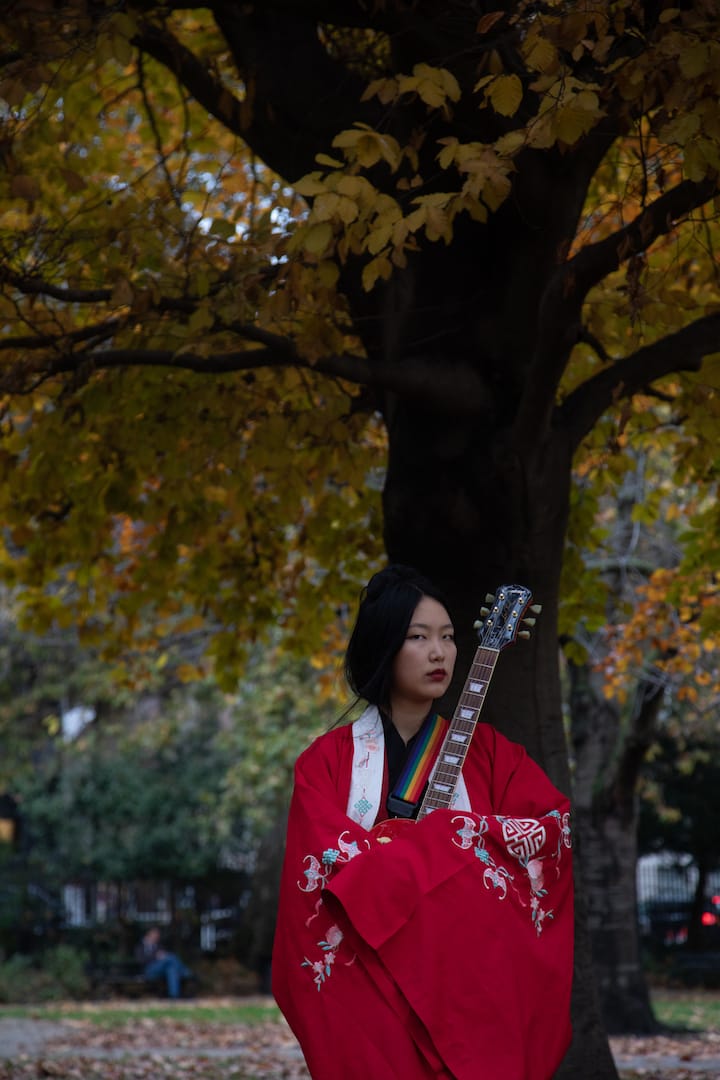Human of SOAS: Notes Edition

In conversation with Yijia
This series seeks to highlight the talent and stories of women musicians of colour at SOAS.
Sasha Patel, BA History and South Asian Studies (Hindi Pathway)
Tell us about yourself, what do you play?
I’m Yijia, a singer-songwriter and instrumentalist. I prefer to use my voice and own creativity as my instrument rather than an actual instrument I love so many musical traditions from across the world, but I won’t be able to learn every single one of them, so I think voice is the best medium. In terms of instruments, I was classically trained in piano since the age of four, and I taught myself the guitar. I also play the Guzheng, a Chinese pentatonic harp. I can’t choose a main instrument, so I would say it’s myself.
How did your experience at a classical music school in China inform your musicianship?
It’s kind of sad because a lot of music schools across China and the world are western-classically based. There’s this hierarchy of music style, and at the top is western music with traditional Chinese music right at the bottom. A lot of the young generation of China are losing a part of our culture, our music. The mainstream music we listen to every day is western pop, so there’s no place for traditional folk music in society. So that’s what I’m trying to do now, be inspired by traditional folk music, but also I have to be mindful and respectful of the idea that I didn’t grow up with this tradition. So I’m trying to bring my own inspiration and creativity as a millennial who’s grown up in a globalised and cosmopolitan age. I’m adding all the elements I have grown up with that are authentic to my life, but still trying to connect with the past.
Tell us about your experience on ‘Sing My Song’ in China
When I was 16/17 I started writing my own songs, and I got discovered by one of the biggest TV shows in China called ‘Sing My Song’. I only did it to get out of going to classes in high school, but I wasn’t expecting it to change my life at all. Within the first two hours, the episode was shared, everything changed, I guess because I was really young it made it more impressive. So many people were talking about it on the internet, when I walked down the street people recognised me and when I checked the news on my phone my face was right there. I was very lucky because my mentor for the show, Liu Huan (the godfather of Chinese pop music) really encouraged me and appreciated my talent so he offered to produce an album for me.
What brought you to SOAS?
When the album came out it won a lot of awards. We worked with the top musicians that we could find in China, grammy award-winning engineers, the Chinese Philharmonic Orchestra and it won many Chinese music awards. All these crazy things were happening but I realised I didn’t just want to become a pop star, I wanted to study somewhere else. I had already learned from the best musicians in China but I thought London would be a great choice. A lot of important things happened in the UK, from the Beatles to rock and punk. I wanted to study the music traditions I didn’t have access to. When I came to SOAS, I felt like I had a stronger power behind me from this ancient tradition that I can represent. I can learn and share music with my friends here who also have beautiful music traditions because music connects us despite barriers of languages and culture.
How does the use of the term ‘World Music’ impact musicians?
What is ‘world music’? The whole world? In comparison to the mainstream western-centric music industry, everything in world music is marginalised, which isn’t good as everything isn’t given its platform of genre. So by giving it this name, you’re not allowing them to be individual but it could also help in finding other music. Because all of us are marginalised, so in a way, it’s stronger when we’re together because, through one music tradition, we can find another. Festivals like WOMAD do have a colonial history, but it’s still a good step up.
How has moving to London impacted your musical experience?
When you look at London it is really diverse, but if you listen to the music here, it’s not at diverse as you think. And I think that says a lot about it deep down. Look at food, for example, you see so many types of food when you’re walking down the street, but if you look at Spotify top charts, you would then only be able to eat fish and chips for every meal. That’s just not very exciting. I don’t blame everyday folk, but even musicians don’t listen to different types. That’s why I appreciate the course at SOAS so much, you come across all the rhythms of African music and the scales in middle eastern and Indian music. If your painting was just three colours, there’s 30 more you can use.



